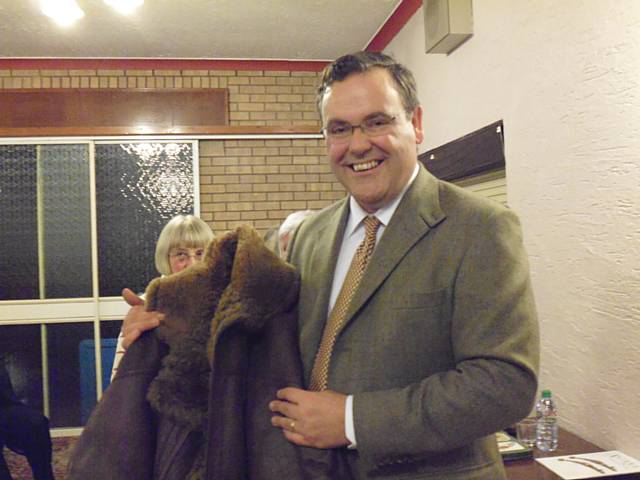Paul Laidlaw at Rochdale Antiques Society
Date published: 23 November 2015

Paul Laidlaw, an expert in military antiquities, at Rochdale Antiques Society
Paul Laidlaw, an expert in military antiquities, spoke to Rochdale Antiques Society about war items that members had brought, including a collection of rifles and bayonets.
Paul Laidlaw explained that he had been to the battle fields of the First World War many times and had noted there was a lot of trench art for sale. Although a few of these may have been made in the trenches, it was more likely that they were created in cottage industries catering for the tourist trade which had started as early as the 1920s following the promotion of Battlefield Guides by Michelin.
Bayonets were attached to rifles to give the men on the ground a chance against the cavalry, their length being determined by the rifle plus bayonet having to be longer than a cavalry man could reach from his horse.
In 1680 they had plug bayonets that were literally pushed into the barrel of the gun. These were replaced in 1700 by socket bayonets which remained in place when the gun was fired. By 1850 the Enfield rifle was standard issue, with a bayonet that could be locked to the body of the rifle.
The Germans had a bayonet in 1905 called a butcher because it had saw teeth down one side, now known as saw-backs, but they were withdrawn, as their effect was very cruel and Britain used this cruelty as propaganda against the Germans.
The Germans also produced a trench knife which was issued to the German army to be used as a tool rather like a Swiss army knife, but in practice it was used as a variation of a bayonet.
Some bayonets had a hook, called a quillon, which was supposed to hook the opponent’s bayonet and disarm him, but this was removed in 1913 as it didn’t work as intended and became merely an obstruction.
Ordinary bayonets sell at the moment for about £85, but with a quillon this would go up to £500, whereas a saw-back would be about £300 and a good German trench knife up to £200.
Other items brought to the meeting included an Irving leather flying jacket from the Second World War in perfect condition and complete with the Air Ministry label, worth about £850, a Boer War medal with clasp worth up to £300 and a rare German U-boat set of binoculars in excellent condition. These special binoculars were gas impregnated as well as leather coated and the lenses were of the very best quality. They would be worth about £1,000.
Following his fascinating talk, members were able to ask him individual questions about their war time memorabilia.
Do you have a story for us?
Let us know by emailing news@rochdaleonline.co.uk
All contact will be treated in confidence.
Most Viewed News Stories
- 1Royton haulage firm fined after Rochdale dad went to work and didn’t come home
- 2Unique colour and sound experience comes to Rochdale in May
- 3Rochdale church to host Camerados public living room
- 4Ogden family announces intention to invest £2m in Rochdale AFC
- 5Man convicted after police car filmed driving dangerously in Kirkholt
To contact the Rochdale Online news desk, email news@rochdaleonline.co.uk or visit our news submission page.
To get the latest news on your desktop or mobile, follow Rochdale Online on Twitter and Facebook.


